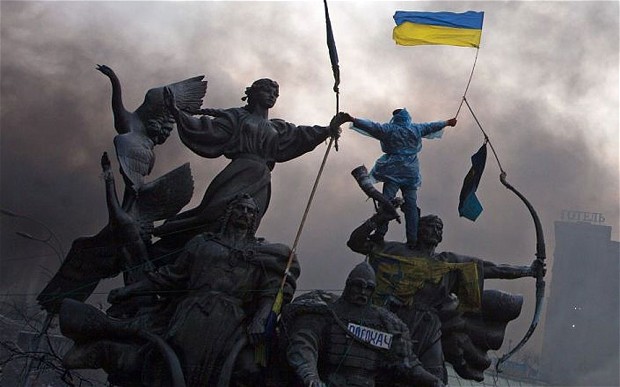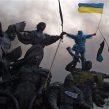
Diplomacy Delivers Another Pause for Struggling Ukraine and Sinking Russia
Publication: Eurasia Daily Monitor Volume: 12 Issue: 25
By:

The week of February 2 registered an explosion in political intrigue around the war in eastern Ukraine, and some sort of pause in hostilities is likely to ensue. Undoubtedly, this is a positive development, but it would be an overstatement to describe the late-night talks in the Kremlin between President Vladimir Putin and the two European envoys—German Chancellor Angela Merkel and French President Francois Hollande—as the “last chance” to stop the war (Gazeta.ru, February 7). The five-hour talks concluded without any agreement or press conference. And during their brief photo-session, the three leaders wore their sternest facial expressions, demonstrating how hard it was to reach the compromise, which in fact had been pre-negotiated (Kommersant, February 7). Merkel and Hollande held several rounds of phone talks with Putin before hitting the road for their shuttle diplomacy, in which their first stop was Kyiv before proceeding to Moscow. That trip was followed up with another four-way phone conference on Sunday (Polit.ru, February 7). The parties, indeed, need to show personal commitment to the deal, primarily to their respective domestic audiences. At the same time, they likely realize full well that this latest peace initiative has begun unraveling well before any signing ceremony could take place, if it happens at all (Moscow Echo, February 6).
What strengthened the European hand in this over-dramatized bargaining was the meeting of North Atlantic Treaty Organization (NATO) defense ministers last Thursday (February 5). At the defense ministerial, the Alliance participants made more concrete decisions regarding establishing new command infrastructure in the Baltic states, Poland, Bulgaria and Romania for deployment of the newly-strengthened Rapid Response Force (Nezavisimaya Gazeta, February 5). Russian propaganda has portrayed what it claimed to be NATO’s “aggressive encroachments” for many months. But as the North Atlantic Alliance is now, indeed, growing more determined to build up its defensive posture, the Kremlin has to re-evaluate its own space for maneuver (RBC.ru, February 6). NATO’s no-nonsense tone in the discussions of the Ukraine crisis became quite clear at the annual Munich Security Conference last weekend, as United States Air Force General Philip M. Breedlove, who currently holds the position of Supreme Allied Commander in Europe, called for using “all tools in the toolbox” in order to stop Putin from “prosecuting the military solution” in Ukraine (Newsru.com, February 6).
One such tool is the supply of arms and military equipment for the Ukrainian Armed Forces, and the possible change of attitude in the White House regarding arming Ukraine with lethal defensive weapons was certainly registered in Moscow (Nezavisimaya Gazeta, February 3). In the Russian mainstream “patriotic” perspective, any objections to arming Ukraine voiced by influential political lobbies in Washington were merely camouflage for Washington’s expanding involvement in managing the war. Whereas the visit to Kyiv of Secretary of State John Kerry last week was interpreted in Moscow as sure evidence of the beginning of a massive delivery of US military aid to Ukraine (Rossiiskaya Gazeta, February 2). Both Merkel and Hollande prefer not to deal with the issue of weapons for Ukraine, which gives them a useful trump card in their talks with Putin. But all the performers of this diplomatic dance are aware that in the US National Security Strategy, released on February 6, Russian intervention in Ukraine is defined as “aggression” (Rbc.ru, February 6).
The escalation of rebel attacks since mid-January, including the shelling of Mariupil, has indeed left few doubts about the scale of deployment of Russian heavy weapons in the war zone—yet, grave questions remain about what the Kremlin seeks to achieve. The Ukrainian army has suffered more setbacks, but it is gaining in experience and organization. So every battle demands the arrival of thousands of new Russian “volunteers” to fill the ranks of rebel forces—and the supply is growing short (Novaya Gazeta, February 4). Every bit of Western “non-lethal” military aid adds to the capabilities of the Ukrainian army and boosts morale. Therefore, as Russian generals plan for the next offensive strike, the need to employ air power—a force multiplier that Russia has not yet used in the conflict—looks increasingly necessary (Nezavisimoe voennoe obozrenie, February 6). This, however, would make it impossible for Putin to preserve his fig leaf of “plausible deniability,” and the talks with Merkel and Hollande make it imperative that he keep this garment. He tried to re-establish Russia’s position of military strength, but has been met with NATO’s readiness to respond and US decision-making gradually considering arming Ukraine. Meanwhile, his European peers are carefully steering him toward a position of economic weakness.
Russia’s unfolding economic disaster breaks new records every week. Last week, inflation made the news by reaching 15 percent (year-to-year), despite the concurrent relative stability in the global oil price (Kommersant, February 6). For the first time in 15 years, the official statistics registered a fall in Russians’ disposable income; conservative estimates propose a contraction of 6.5 percent in 2015 (Gazeta.ru, February 3). The sustained decline in investment activity and capital flight, meanwhile, translate into closures of many businesses. According to one estimate, this exodus has resulted in the out-migration from Russia of about half a million European citizens, including 100,000 Germans (RBC Daily, February 4). Putin tries to demonstrate personal attention to the most painful economic problems. And last week, he made a scene at a government meeting demanding the restoration of local train schedules, pretending that the guilty party is not his courtier, Vladimir Yakunin, the boss of Russian Railways (Forbes.ru, February 5). One corollary from this accelerating recession is that Moscow cannot pay for the war in eastern Ukraine or for rebuilding the occupied “rump Novorossiya,” so every village captured by the Russia-backed separatists adds to this bankruptcy (Slon.ru, February 6).
Western tactics of containing Russia and engaging Putin in a conversation worked perfectly last week—even if Merkel’s terse comment at Munich that the Moscow talks made sense suggested that negotiations have been fruitless (Kommersant, February 7). No guarantee exists, however, that this Western approach will continue working for the next couple of weeks. In fact, the hopes for “freezing” the conflict clash with assessments that every pause works to Putin’s disadvantage, denying him an opportunity to compensate for the pains of the recession with joys of another military “victory.” It is the Ukrainian army that will face the next attack, and it probably will fail again to stop it—but it is essential to ensure that it “fails better.”




